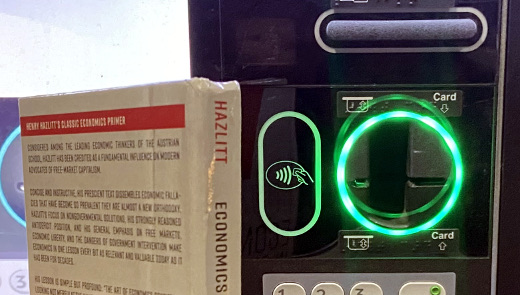My Takeaways From Economics In One Lesson

Economics. When you hear that word, what do you think? For some, it's a view of the world and how it operates. For others, they simply ignore it. For myself, as aware as I like to be of what happens in and around me, the topics of economics was always a fragmented one.
Taking Economics 101 in college didn't help things. It may have been a combination of things, including the nickname for my professor being "shaky" which was related to his hand gestures, how much alcohol he reportedly drank and likely both. The constantly exploding red pens in his shirt pockets was another distraction. I will never forget when he typed tests on a manual typewriter, he simply backspaced and put a slash thru mistakes and kept typing. Though these are no excuses, all my memories from that class are non-academic.
When I learned about a book called Economics in One Lesson by Henry Hazlitt, I had to check it out. Both being "one" lesson and being free were enticing to me. The book was offered by the Mises Institute, a libertarian think tank, and I took them up on their offer to receive a printed copy of the book, an offer unfortunately is no longer available. Hazlitt, a libertarian author, originally wrote the book in 1946 and it was revised and extended in 1979. As libertarians (and I am grossly summarizing here) believe in very small government and free markets, I was interested in what I learn from the text, as some of my own world views are in line with this thinking.
As I read through the pages of Economics in One Lesson, it helped me structure the bits and pieces of economics I have collected over the years, and I had several takeaways from it.
Simple examples – To setup what I was about to learn, in the early pages of the book was a hypothetical story of a store keeper who was saving for a new suit but had to spend the money on a new window when one in his shop was broken. As a result there was no net benefit to economy – the window glazer made out but the tailor did not, and neither did the store keeper for that matter. Stories like this and others help set the stage and drive home concepts throughout the book.
Global view – Hazlitt states that to truly study an economic impact you must trace both short and long term impacts and impacts on a special group and everyone impacted by it. He gave examples of laws and decisions made by governments that benefit one group at the expense of another, and that impact may be long after the decision is made and executed upon.
So what is Credit? – A statement that stuck out to me is regarding credit, that is something we already have not something a lender gives us. Granted if I walked into any bank and said that they would laugh at me and want to see my FICO score, but it is something I recall whenever the topic of credit comes up.
Economic Sybil – The idea that we have multiple economic personalities was something I hadn’t thought about. Some of those include being a producer, taxpayer and consumer, and the thinking around each will have some common and uncommon components.
Economics in One Lesson was an enjoyable read, something I wasn’t expecting for a book on this topic. It was written in a way to educate without shaming and didn’t pretend to be the one and only book you should read on economics, as in the end there were suggestions for further study. Where the offer to get this book for free no longer exists, I recommend picking up a copy if you are interested in learning or brushing up on economics. For the giveaway of this book, it is going to stay in the house for now as my lovely wife is interested in brushing up on what she learned here and abroad in economics.
This is from The Hot Iron, a journal on business and technology by Mike Maddaloni.
Did you enjoy this? Subscribe to The Hot Iron by RSS/XML feed or Read by Email
Book Take-Aways • (0) Comments • PermalinkComments
Post a Comment
Note: Comment moderation is active, and your comment will be viewable once it is reviewed.

